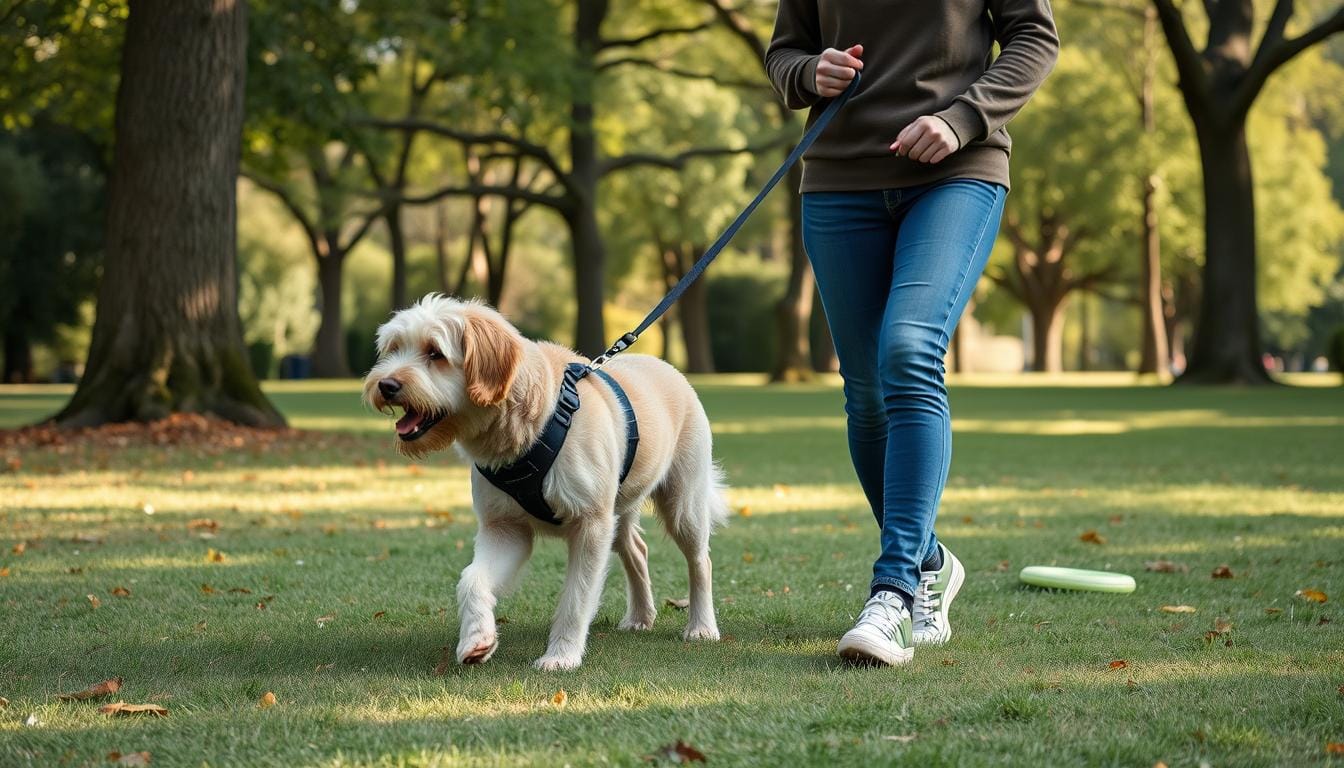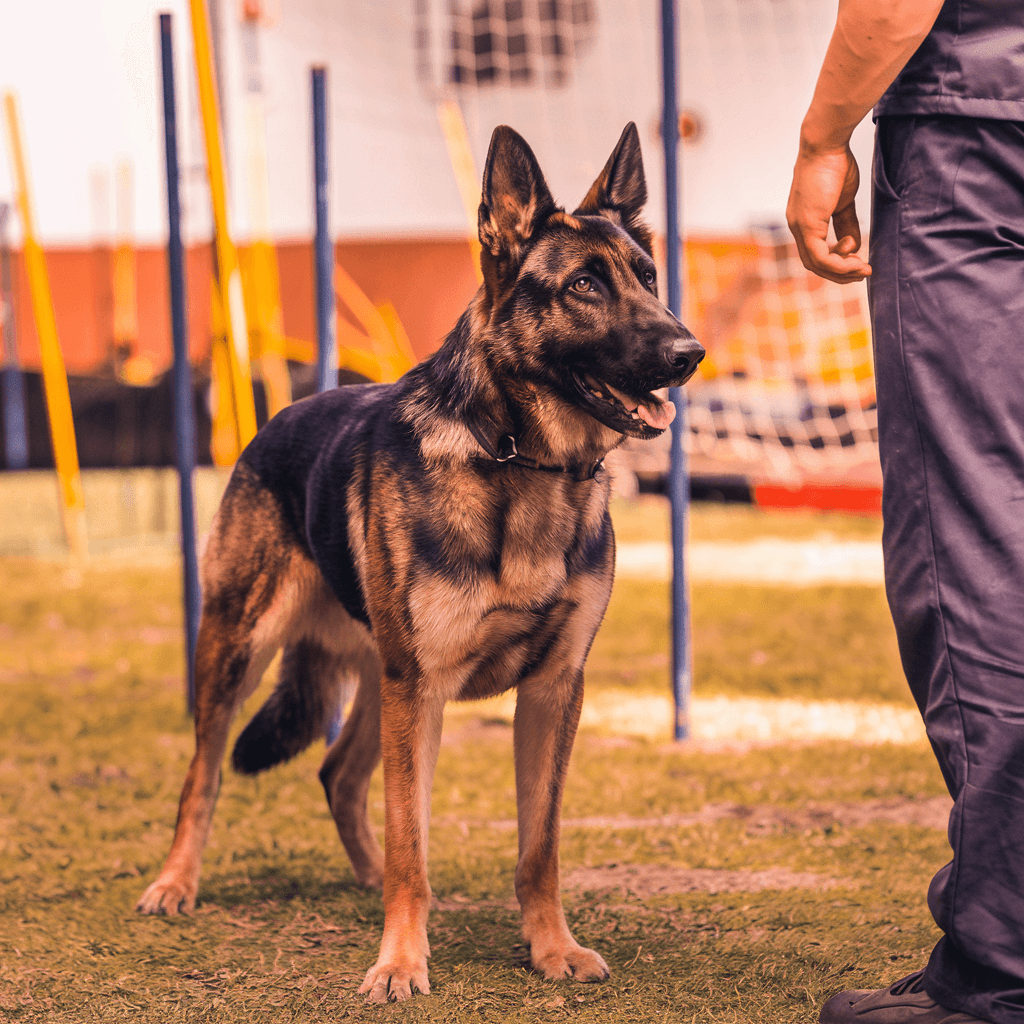As our furry friends age, their nutritional needs change. Understanding senior dog nutrition is key to keeping aging dogs healthy and vibrant. We’ll explore what your older pup needs to thrive in their golden years.
Did you know that large breeds like Great Danes are considered seniors around 5 or 6 years old? In contrast, smaller breeds such as Beagles might not reach their senior years until 8 or 9. This variation in aging patterns highlights the importance of tailoring diets for aging dogs.
A healthy pet diet for senior dogs often includes higher protein content to prevent muscle loss. Experts suggest over 75 grams of protein per 1,000 calories. Some older dogs may need more fat for weight gain, while others require dietary fiber adjustments for better digestion.
It’s crucial to note that there’s no official regulation distinguishing senior dog food from regular adult dog food. This means we need to be extra vigilant about what we’re feeding our older pups. Regular vet check-ups, ideally twice a year, can help monitor health changes and adjust diets accordingly.
Key Takeaways
- Senior dog age varies by breed size
- Higher protein diets help maintain muscle mass
- No official regulations for senior dog food exist
- Twice-yearly vet visits are recommended for seniors
- Dietary needs change with age and health conditions
- Proper nutrition can positively impact the aging process
Understanding When Your Dog Becomes a Senior
As dog owners, we must know when our pets reach their golden years. This knowledge helps us adjust their care and diet to meet their changing needs. The aging process in dogs varies greatly depending on size and breed, making it crucial to understand these differences.
Size-Based Age Classifications
Dogs age at different rates based on their size. Smaller breeds tend to live longer than larger ones. Here’s a general guideline:
| Dog Size | Senior Age | Life Expectancy |
|---|---|---|
| Small (e.g., Yorkshire Terrier) | 11 years | 15-20 years |
| Medium (e.g., Labrador Retriever) | 7 years | 12-15 years |
| Large/Giant (e.g., Great Dane) | 5-6 years | 8-10 years |
Breed-Specific Aging Patterns
While size plays a significant role, breed-specific factors also influence aging. Mixed-breed dogs typically reach senior status around 7 years old, but this can vary based on their genetic makeup. Understanding these patterns helps us tailor our approach to aging dog dietary needs.
Signs of Aging in Dogs
Recognizing the signs of aging is crucial for providing proper care. Watch for:
- Weight gain or loss
- Decreased activity levels
- Changes in sleep patterns
- Dental issues
- Joint stiffness or arthritis
As dogs age, their nutritional requirements change. A canine geriatric diet often includes lower-calorie options to prevent obesity and higher-quality protein sources to maintain muscle mass. Regular vet check-ups, at least twice yearly, are essential for monitoring your senior dog’s health and adjusting their care plan accordingly.
Senior Dog Nutrition, Aging Dogs, Healthy Pet Diet
As our furry friends age, their nutritional needs change. We must adjust their diets to support their health. A balanced diet is key to keeping aging dogs lively.
Before switching to senior dog food, a vet visit is crucial. These visits include physical exams, diet history reviews, and blood tests. While no test alone can tell a dog’s nutritional status, vets use all this info to check their health.
Special diets can help with health issues in aging dogs. Hill’s Science Diet offers many options for senior dogs. These diets help with digestion and keep dogs feeling their best.
| Dog Size | Senior Age (Years) | Human Age Equivalent |
|---|---|---|
| Small Breeds | 7-9 | 44-52 |
| Large Breeds | 5-7 | 36-60 |
Keeping senior dogs at a healthy weight is important. Regular exercise, like walking or swimming, helps keep muscles and joints flexible. Mental activities can also help prevent cognitive decline in older dogs.
“Dogs maintaining an ideal weight can live up to two years longer than overweight dogs.”
Remember, yearly vet visits are key for senior dog health. These visits help catch any health issues early. This ensures our aging friends get the best care.
The Changing Nutritional Needs of Aging Dogs
As dogs get older, their diet needs change. We’ll look at how their metabolism, protein needs, and calorie intake shift. Knowing these changes helps us give them the best food for their age.
Metabolic Changes in Senior Dogs
Dogs become seniors between 6 and 8 years old. Their metabolism slows down, which affects their energy needs. Studies show their daily energy needs may drop by 12-13% as they age.
This change means they need a different diet to stay healthy and at a good weight.
Protein Requirements for Older Dogs
Protein is key for keeping muscle mass and health in older dogs. Research suggests they might need up to 50% more protein than younger dogs. A Purina study found that 8-year-old Pointers on a 45% protein diet kept more muscle than those on a 16.5% protein diet.

Fat and Calorie Considerations
Senior dogs need fewer calories but the right diet is still important. A diet low in calories but high in protein helps with fat loss and keeps muscle. This balance is key for keeping them healthy as they age.
| Nutrient | Adult Dog Food | Senior Dog Food |
|---|---|---|
| Protein (%) | 18-30 | 18-23 |
| Calorie Density | Higher | Lower |
| Fat Content | Moderate | Reduced |
Switching to senior dog food should be done slowly, over 7-10 days, to avoid stomach problems. For dogs with health issues, vets might suggest special diets.
Essential Nutrients for Senior Dog Health
As dogs get older, their diet needs change. We must choose food that’s right for their age and health. This includes keeping their joints healthy. The Association of American Feed Control Officials (AAFCO) says dogs need water, carbs, vitamins, minerals, fat, and protein.
Older dogs need more protein to keep their muscles strong. Veterinarian Ernie Ward says they need 50% more protein than younger dogs. AAFCO suggests at least 18% protein for adult dogs, but seniors should get 28-32%.
Fats are key for senior dogs. They give energy and help with inflammation. Omega-3 fatty acids are good for their joints and may fight osteoarthritis.
- Aim for 700-1,500 mg of combined EPA and DHA in omega-3 supplements
- Consider 1-2 fish oil capsules per 10 pounds of body weight
Vitamins and minerals are crucial for senior dogs. Antioxidants can boost memory and brain function. It’s important to choose the right food for them.
When picking dog food, look for brands like Hill’s, Purina, and Iams. These brands follow AAFCO standards. They ensure their food meets senior dogs’ needs, helping them stay healthy and live longer.
The Role of Protein in Senior Dog Diets
Protein is key for senior dog nutrition and weight management. As dogs get older, their diet needs change. Protein becomes a vital part of their meals.
Protein Quality vs. Quantity
Senior dogs need more protein to keep their muscles strong. Research shows they need about 50% more than younger dogs. For healthy seniors, we suggest diets with 28 to 32% protein.
Digestibility Factors
As dogs age, how well they digest protein matters more. Some seniors may have trouble absorbing nutrients. It’s important to choose high-quality, easy-to-digest protein sources.
Special Protein Considerations for Health Conditions
Even though protein is important, some health issues might need special care. Dogs with kidney problems might need less protein and phosphorus. Always talk to a vet for the right diet plan.
| Protein Needs | Young Adult Dogs | Senior Dogs |
|---|---|---|
| Protein Requirement | Base level | 50% more than base |
| Recommended Protein (DMB) | 18-25% | 28-32% |
| Digestibility Focus | Moderate | High |
Getting the right amount of protein is crucial for senior dogs. It helps keep muscles strong, boosts the immune system, and supports overall health. Choosing high-quality, digestible proteins helps our aging pets live their best lives.
Hydration and Water Requirements
Keeping your aging dog hydrated is key to their health. As dogs get older, they might drink less water. We’ll look at why water is important for senior dogs and how to keep them hydrated.

Water is essential for dogs of all ages. But for older dogs, it’s even more important. It helps their organs work right, aids digestion, and keeps their joints healthy. Without enough water, older dogs can get sicker and face serious problems.
To help your aging dog stay hydrated, try these tips:
- Always have fresh, clean water available
- Keep water bowls clean to stop bacteria
- Add water to their dry food or give them wet food
- Use pet drinking fountains to make water more appealing
- Watch how much water they drink and talk to a vet if you’re worried
Remember, how much water a senior dog needs depends on their size, how active they are, and their health. Tailor their hydration plan to fit their needs. By focusing on hydration, we can help our older dogs stay healthy and happy.
| Dog Size | Daily Water Intake (oz) | Equivalent in Cups |
|---|---|---|
| Small (up to 20 lbs) | 20-40 | 2.5-5 |
| Medium (21-50 lbs) | 40-80 | 5-10 |
| Large (51-90 lbs) | 80-120 | 10-15 |
| Giant (91+ lbs) | 120+ | 15+ |
Weight Management Strategies for Senior Dogs
As dogs get older, their diet needs change. It’s important to manage their weight. We’ll look at ways to keep your senior dog healthy and active.
Portion Control Methods
It’s crucial to control portions in a senior dog’s diet. Research shows dogs eating 25% fewer calories can live almost two years longer. Make sure to measure all your dog’s food to manage their intake well. Aim for a 3-5% weight loss each month for overweight seniors.
Meal Frequency Recommendations
Break down daily nutrients into small meals. This keeps energy levels steady and helps with digestion. Choose several small, low-calorie treats instead of one big one. Treats should not make up more than 10% of your dog’s daily calories.
Monitoring Body Condition
Regular vet visits are essential. Vets use a Body Condition Score (BCS) from 1 to 9, with 5 or 6 being perfect. Dogs scoring 7 or higher face serious health risks. Breeds like Basset Hounds and Labrador Retrievers are more likely to get overweight.
| Weight Status | Lifespan Impact | Health Risks |
|---|---|---|
| Ideal Weight | Up to 2 years longer | Lower risk of heart issues, diabetes |
| Overweight (15% above ideal) | 5 months shorter (large breeds) | Increased risk of joint problems |
| Obese (30% above ideal) | 2+ years shorter (small breeds) | Higher risk of heart disease, diabetes |
By using these strategies, we can help our senior dogs stay at a healthy weight. This supports their overall health and helps them live longer.
Supplements and Additives for Aging Dogs
As dogs get older, their diet needs change. Supplements are key to supporting their health. We’ll look at important additives for our senior dogs.
Joint Support Supplements
Joint health is a big worry for older dogs. Glucosamine and chondroitin help protect cartilage and ease pain. For a 50-pound dog, these supplements cost $15 to $25 a month.
Green-lipped mussel extract is also popular. It might help reduce inflammation.
Cognitive Function Enhancers
Older dogs can benefit from brain health supplements. Antioxidants like vitamins C and E may boost memory and thinking. MCT oils give the brain a new energy source, improving focus.
Neutricks is a cognitive support supplement. It costs about $45 a month for a 50-pound dog.
Omega-3 Fatty Acids Benefits
Omega-3 fatty acids from fish oil or shellfish are great for seniors. They may reduce joint pain, improve cell health, and enhance skin and coat. Omega-3 supplements cost $10 to $20 a month for a 50-pound dog.
Supplements can greatly benefit older dogs. But, always talk to a vet before adding them. They can help choose the right supplements for your dog’s health needs.
Transitioning to Senior Dog Food
As our furry friends get older, their diet needs change. Moving to senior pet food is key for their health. The switch should be slow, taking 7 to 10 days or more to avoid stomach issues.
Senior dog foods meet the special needs of older dogs. They have fewer calories to stop weight gain and more fiber for better digestion. Ingredients like omega-3 fatty acids, glucosamine, and chondroitin help keep joints healthy.
Key Benefits of Senior Dog Food
- Enhanced digestibility
- Support for brain function
- Improved energy and vitality
- Maintenance of healthy weight
- Promotion of skin and coat health
When switching to senior food, think about your dog’s specific needs. Big dogs might need senior food sooner than small ones. Talk to your vet to find the right time for the change.
| Week | Current Food | Senior Food |
|---|---|---|
| 1 | 75% | 25% |
| 2 | 50% | 50% |
| 3 | 25% | 75% |
| 4 | 0% | 100% |
Senior pet food is just part of keeping older dogs healthy. Adding supplements like probiotics can help with digestion and immune health. By slowly changing to senior food, we help our pets age well and comfortably.
Common Health Issues and Dietary Solutions
As dogs age, they face various health challenges. We’ll explore common issues and how age-appropriate dog food can help manage these conditions.
Arthritis and Joint Health
Joint health is a big concern for senior dogs. Many older dogs develop arthritis, which affects their mobility and quality of life. Foods rich in omega-3 fatty acids and glucosamine can help support joint health.
Some age-appropriate dog foods include these nutrients. They promote comfort and mobility in senior pets.
Dental Health Considerations
Dental disease is common in older dogs. Soft foods or kibble designed for seniors can help maintain dental health. Regular dental check-ups and the right food choices are key to preventing oral issues in aging dogs.
Digestive System Changes
Senior dogs often experience digestive changes. Age-appropriate dog food with easily digestible proteins and fibers can support their changing nutritional needs. It’s important to adjust portion sizes and meal frequency based on individual requirements.
| Health Issue | Dietary Solution | Benefits |
|---|---|---|
| Arthritis | Omega-3 rich foods | Reduced inflammation, improved mobility |
| Dental Problems | Soft or specially formulated kibble | Easier chewing, dental health support |
| Digestive Issues | Easily digestible proteins and fibers | Better nutrient absorption, improved digestion |
By addressing these common health issues through proper nutrition, we can significantly improve the quality of life for our senior canine companions. Always consult with a veterinarian to create a tailored diet plan for your aging dog’s specific needs.
Treats and Snacks for Senior Dogs
Treats are a big part of our dogs’ lives, but they change as they get older. We must think about their nutritional needs and weight management when picking treats.
Healthy Treat Options
For older dogs, it’s best to choose low-calorie treats. Look for ones with less than 10 calories per piece. Water-rich veggies and small fruits are great snacks. They help with weight control and let them enjoy treats.
Portion Control for Treats
It’s important to control how many treats senior dogs get. Don’t give them more than 10% of their daily calories. This keeps their diet balanced and prevents weight gain.
Best Practices for Treating Seniors
Stay away from table scraps, which can be too fatty and salty. Choose treats made for senior dogs instead. These can add to their diet and offer health benefits. Treats should be a bonus, not a main part of their diet.
| Treat Type | Benefits | Considerations |
|---|---|---|
| Low-calorie commercial treats | Portion-controlled, nutritionally balanced | Check for senior-specific formulas |
| Fresh vegetables | Low in calories, high in nutrients | Ensure they’re dog-safe varieties |
| Small fruit pieces | Natural sweetness, vitamins | Limit quantity due to sugar content |
By picking the right treats and controlling portions, we can make sure our senior dogs enjoy snacks. This keeps them healthy and at a good weight.
Conclusion
Senior dog nutrition is crucial for aging dogs. It helps keep them healthy as they get older. Studies show older dogs can digest nutrients well, even better than younger ones.
In the U.S., more dogs are getting older. About 33% are between 6-10 years old, and 15% are over 11. Small dogs become seniors at 12-14 years, while big dogs may be seniors by 7-9 years. The right diet can make a big difference in their life.
Senior dog nutrition is more than just food. It’s about giving them a balanced diet that meets their needs. High-quality protein and essential nutrients are key. Regular vet visits and monitoring their health are also important.
















